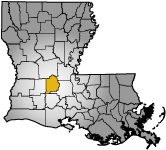SECTION: 1000 FAIR AND IMPARTIAL POLICING
SECTION_1000_FAIR_AND_IMPARTIAL_POLICING.docx
SECTION: 1000
TITLE: FAIR AND IMPARTIAL POLICING
EFFECTIVE DATE: DECEMBER 2019
AMENDED DATE: (RESCIND) DECEMBER 2022
EFFECTIVE: JUNE 26, 2025
- PURPOSE:
The purpose of this General Order is to affirm the Evangeline Parish Sheriff's Office commitment to equitable provision of policing services without bias or preference. Fair and impartial policing is essential to the integrity and legitimacy of Evangeline Parish Sheriff's Office law enforcement activities and community service mission. This policy establishes Evangeline Parish Sheriff's Office requirements for all police-community interactions and prescribes training, supervision, and reporting requirements to ensure fair and impartial policing. - POLICY:
It is the policy of the Evangeline Parish Sheriff's Office to treat all members of the public in a fair, respectful, impartial, and non-discriminatory manner. Evangeline Parish Sheriff's Office must establish and maintain partnerships with members of the community to engage in effective community policing. Discriminatory or biased policing is illegal, alienates community members, fosters community distrust, perpetuates false and harmful stereotypes, undermines effective law enforcement, and is strictly prohibited. - DEFINITIONS:
- DISCRIMINATORY OR BIASED POLICING
Law enforcement policies, practices or actions that result in the differential treatment of, or have an unwarranted discriminatory impact on, any individual or group on the basis of actual or perceived personal characteristics. Characteristics include, but are not limited to, race, color, ethnicity, natural origin, religion, gender, gender identity, gender expression, sexual orientation, age, immigrant status, disability, economic status, housing status, occupation, and language ability. - COMMUNITY POLICING
A philosophy that promotes organizational strategies that support the systematic use of community partnerships and problem-solving techniques to proactively address the immediate conditions that give rise to public safety issues. Collaborative partners include neighborhood associations, schools, social services and other community stakeholders. - REASONABLE SUSPICION
Suspicion that is more than a mere hunch, but is based on a set of articulable facts and circumstances that would warrant a person of reasonable caution in believing that a violation of the law has been committed, is about to be committed, or is in the process of being committed, by the person or persons under suspicion. This information can be based on observations, training, and experience, or reliable information received from credible outside soucres. - PROBABLE CAUSE
When the facts and circumstances known to the officer at the time would justify a prudent person in believing the person commitment or was committing an offense. - ENFORCEMENT ACTIVITIES
Activities both on and off-duty undertaken by Sheriff's Office personnel that arise from their authority related to employment, oath of office, state statue or Federal Law. Law enforcement activities include, but are not limited to, contacts, stops, weapons pat-downs, searches, citations, property seizures, arrests, uses of force, and responses to calls for service. - VOLUNTARY CONTACT
A non-investigative consensual encounter between an Evangeline Parish Sheriff's Office Deputy and one or more person(s) with the intent of engaging in a casual and/or non-investigative conversation (e.g.,speaking with a local business owner or resident). The person(s) is free to leave or decline any request by the officer at any point. - NON-CUSTODIAL INTERVIEW
A consensual contact during which a Deputy may ask questions or try to gain information about possible criminal activity without indicating or implying that a person is not free to leave or is obligated to answer that Deputy's questions. - INVESTIGATIVE STOP
The temporary involuntary detention and questioning of a person based on reasonable articulable suspicion that the person is committing, is about to commit, or has committed a crime. It occurs whenever a Deputy uses words or takes actions to make a person halt, to keep a person in a certain place, or to compel a person to perform an act. If a reasonable person under the circumstances would believe that they are not free to leave, a "stop" has occurred. - VEHICLE STOP
The involuntary detention of a vehicle and the driver and/or the occupants of the vehicle. - WEAPONS PAT-DOWN
A brief, non-probing running of the hands over the outside of a person's clothing feeling for a weapon. A weapons pat-down is authorized when the Deputy reasonably suspects the person armed. This can include situations in which the Deputy reasonably suspects that the person has committed, is committing, or is about to commit a violent crime or when the Deputy observes something on the person that they reasonably suspect is a weapon. A weapons pat-down may not be conducted to discover evidence or the proceeds or instrumentalities of a crime. A Deputy cannot "pat-down" a bag or item of persona property unless the Deputy has a reasonable suspicion that the person is armed and the bag or item could contain a weapon and is within the person's reach. - SEARCH
An inspection, examination or viewing or persons, places, or items in which a person has a legitimate expectation of privacy. A search need not be visual; it may include grasping, prying into or manipulating persons or objects (e.g., reaching into a purse or pocket, physical manipulation of a duffel bag,etc). - ARREST
The taking of one person into custody by another. To constitute arrest there must be an actual restraint of the person. The restraint may be imposed by force or may result from the submission of the person arrested to the custody of the one arresting him/her. (La.C.Cr.P.Art. 201). Lawful arrests require probable cause that a crime was committed or is being committed. - POLICING REQUIREMENTS
All investigative detentions, traffic, and field contacts, arrests, searches, and seizures of property by commissioned Deputies shall be based on standard of "reasonable suspicion" or "probable cause" as required by the Fourth Amendment of the U.S. Constitution and Louisiana statutory authority. Deputies must be able to articulate specific facts, circumstances.
- DISCRIMINATORY OR BIASED POLICING



